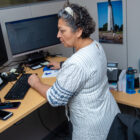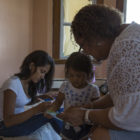Disparities
With Demand For Community Health Workers Rising, So Does Need For Sustainable Funding
|
New Haven Community Health Worker (CHW) Katia Astudillo helps dozens of her clients navigate the logistics of getting vaccinated and connects them with other health services. She even helps them find rental assistance. In and around New London, CHW Lizbeth Polo-Smith hands out flyers about COVID-19 safety and vaccinations at churches, laundromats, stores, warming centers for the homeless—anywhere she can. As COVID-19 laid bare Connecticut’s health care deserts, it now highlights the efforts of CHWs who labored in forgotten neighborhoods for years. In many ways, they have become a key factor in the state’s public health response for marginalized communities during the pandemic.

